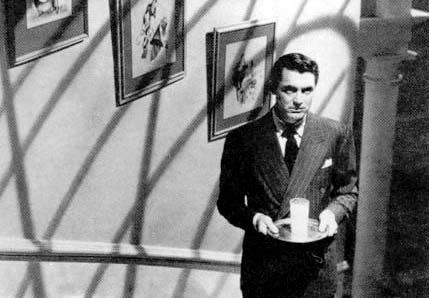Cary Grant was a charming, elegant actor. This is obvious in most of his performances, and toward the end of his career he was typecast as the elegant, romantic older man. In and of itself, there's nothing wrong with being charming and elegant, but unfortunately, it sometimes makes it more difficult to play certain roles. Our evidence for this is the two Cary Grant movies TCM showed today.
Just look at None But the Lonely Heart. Cary Grant plays a ne'er-do-well Cockney who returns home to run his mother's secondhand furniture store when he finds out that she's terminally ill. Business is really tough, with the result that Grant's character is tempted to join a robbery gang to earn enough money to make ends meet. The story itself isn't bad, but Cary Grant oozes so much class that it's really difficult to find him believable in the role.
There's no reason one cannot be both charming, and a bad guy. After all, there are criminals out there who prey on their victims by charming them and by appearing to be something other than what they actually are. Robert Montgomery, another actor whose roles always exuded elegance, played such a bad guy brilliantly in Night Must Fall.  Cary Grant played such a man in Alfred Hitchcock's Suspicion, where he plays an idle playboy who mooches off other people's money, especially that of his wife, Joan Fontaine. Eventually, she comes to believe that he's out to murder her for her money. The problem with the movie, however, is that the producers hated the idea of Cary Grant playing a bad guy, and so they forced Alfred Hitchcock to come up with an ending that would have Grant not be a murderer, which comes across as a deus ex machina.
Cary Grant played such a man in Alfred Hitchcock's Suspicion, where he plays an idle playboy who mooches off other people's money, especially that of his wife, Joan Fontaine. Eventually, she comes to believe that he's out to murder her for her money. The problem with the movie, however, is that the producers hated the idea of Cary Grant playing a bad guy, and so they forced Alfred Hitchcock to come up with an ending that would have Grant not be a murderer, which comes across as a deus ex machina.
MUSIC BREAK: BARNEY MARTIN - MISTER CELLOPHANE
19 hours ago

No comments:
Post a Comment